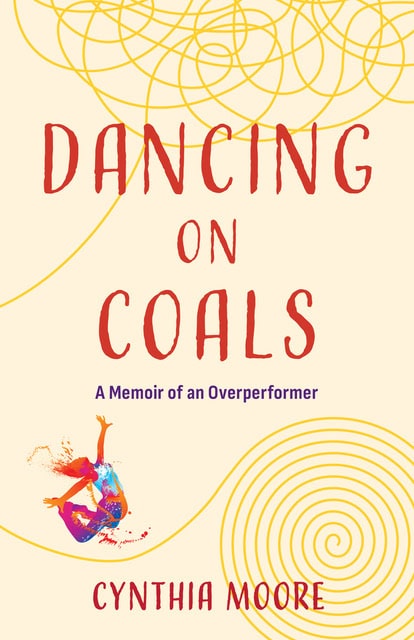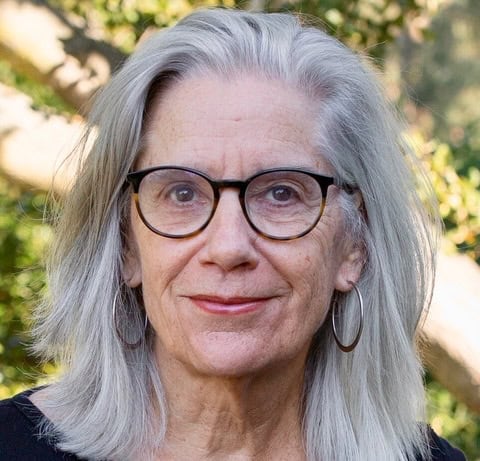BOOK COVER

BOOK DETAILS
Pub Date: March 25, 2025
Genre: Memoir
Publisher: She Writes Press/Simon & Schuster
Page Count: 194
Format: Paperback
ISBN: 978-1647428563
Price: $17.99
ABOUT THE BOOK
From Trauma to Belonging: Wrong Turns, Right Lessons, and the Winding Path to Wholeness
Endorsed by Whoopi Goldberg and tracking a life rich enough to entertain on the silver screen, Cynthia Moore’s Dancing on Coals (She Writes Press – March 2025) takes readers through wildly varied incarnations in the author’s life that both impress and amuse…and sometimes make us shudder. From her childhood in the Bahamas to finishing school in Switzerland, a theater career (including a turn as an award-winning playwright), and becoming a therapist, we take a bumpy roller coaster ride with Cynthia until we ultimately land at her final phase: happiness and peace with her husband, children, and, most importantly, herself.
Dancing on Coals begins at the end: sharing domestic bliss, but the author deftly peels back the layers on the long, emotionally tumultuous journey required to get there. Through beautifully written vignettes, Cynthia introduces us to her drunken parents, particularly a mother whose skills are questionable at best. Having deficient role models for much of her life, the author was programmed to choose less-than-optimal relationships with men until much later, when David enters her life and brings a newfound stability, filled with pancakes and the type of cozy family scenes Cynthia always craved.
At times humorous and self-deprecating, at times poignant and heartbreaking, this is the story of one woman’s path from abandonment to wholeness and authenticity. A memoir for readers who enjoy armchair traveling, madcap real-life episodes, and well-written stories, Cynthia Moore will both captivate you and leave you smiling.
ABOUT THE AUTHOR
Cynthia Moore is an award-winning playwright and performer who wrote and directed theater in the San Francisco Bay Area for over twenty years. A founding member of Otrabanda Company, she worked with the Blake Street Hawkeyes before leaving the theatre to earn a master’s degree in clinical psychology. She has worked as a mental health counselor for twenty-three years, with a particular focus on the connection between spirituality and trauma. She has taught numerous workshops in creativity, writing from the heart, and more.
TIMELY TIE-INS
June
- Global Day of Parents – 1
July
- International Peace & Love Day – 7
August
- We Love Memoirs Day – 31
PRAISE
“I was lucky enough to get to work with Cynthia when I became part of the Blake Street Hawkeyes. I’m not sure that she understood how much she meant to me because we were the two women in the group and I was out of my element and without her I don’t think I could have given myself permission to fly, as only another woman could. Thank goodness she was there and actually saw me and our conversations fed the construction of my one-woman show. She was my good friend….”
—Whoopi Goldberg
“Moore presents an account of quite a notable life spiked with sharp, often funny dialogue, whether she’s detailing the initial courting of her husband or her first sessions as a therapist-in-training later in life. Moore frequently recounts experiencing profound moments, seeming to come to grips with great revelations—only to carry on with her life as before. For readers, though, this habit is not frustrating but relatable, and those taking note will walk away with some wisdom. A wise, insightful, and always-entertaining recollection of a journey of self-discovery.”
—Kirkus Reviews
“Cynthia Moore in her exquisitely written memoir plumbs the richness of an examined life. Moore demonstrates what good writing is—illuminating that which we often cannot see. I absolutely loved this book and couldn’t put it down.”
—Denise Blanc, author of River Logic, Tools to Transform Resistance and Create Flow in all of our Relationships
“Dancing on Coals is, as you might expect from the title, a fast-paced whirlwind, a life story told like the hilarious, emotional, high-stakes adventure that it is. This book is the perfect cocktail of verve, honesty, and warmth. With Cynthia Moore, there is never a dull moment.”
—Charlotte Shane, author of An Honest Woman, a Memoir of Love and Sex Work
“Cynthia Moore’s marvelous Dancing on Coals: A Memoir of an Overperfomer opens with a whammy…an absolutely marvelous piece of writing and memory; it hit me straight on and knocked me down. Confidently told in a lush, rich voice, the memoir is both deeply personal and an historical account of experimental theater. I highly recommend joining Moore on her unique and curious journey.”
—Summer Brenner, author of Dust, A Memoir
Q&A with Cynthia
1. What is the book about?
It’s about finding your voice as a woman, locating your inner power and speaking your truth with humor and honesty. It’s about showing up as your whole self, not just presenting the parts you deem acceptable to others. It’s about how I learned to do that, the bravery it took, and the crazy embarrassing errors I made along the way.
2. What do you hope readers get out of this book?
I hope that readers will have a visceral experience of the transformation from desperation and craving into true peace and relaxation. We all have the capacity to find peace and connect with our true Self, and I hope my readers take away some inspiration that they can release their Hungry Ghosts (Buddhist versions of craving and dissatisfaction) and come into authentic belonging and self-acceptance. It’s what I work on with clients.
3. You write about being a woman in all male environments, what did you learn from that?
I learned that it’s all too easy to compete on the male stage, especially in a world of physical rigor and precision (athletes know this arena). There’s a cost to your authenticity when you’re playing a game with somebody else’s rules. I had to change the game and change the rules. I had to stop focusing outwards (which is a trauma response) and learn to focus inwards.
4. How did growing up in the 60’s/70’ affect you?
We were all in constant protest: the Vietnam War, the military-industrial complex, we wanted to create a whole new paradigm of art, of theater, of feminism, of government, of sexuality, of relationships. It was a wildly creative time, and I was lucky to be born in it.
5. How did your work in the theater affect your work as a therapist?
In the theater, you learn to access and inhabit unfamiliar states, uncover psychic territory unbeknownst to your ordinary mind. This was incredibly useful in working with clients, because I could ask someone who was caught in a trauma state to open to her inner wisdom and learn to inhabit a state of Ease and Flow. Accessing the Flow State is native to the arts, surrendering to a felt sense of trust and internal guidance. This is also useful in therapy. Dropping out of the mind into the body, using our physiology to shift our state.
6. You say in your bio that you have worked specifically with the relationship between spirituality and trauma. How do you see that connection?
Trauma happens in the body. Our nervous system responds to perceived threat with contraction, aggression or shut-down, and our cerebral cortex becomes powerless to shift us out of a fight/flight state. No amount of talk therapy or insight will release the painful grip of trauma. However we can offer the body an alternate physiological state in which we access the parasympathetic nervous system, or the Ease/Release/Flow state. How do we do that? By eliciting what the Buddhists call the Bigger Self, what I call the Wise Self. Notice how even hearing the name of your Wise Self calls up a slight softening of your musculature, a widening of your perspective. We can cultivate this Flow state in clients by teaching them how to access it, how to build the muscle memory of it, how to return to it, navigating from fight/flight into an Ease state by deploying newly learned physiological guidance systems. In essence, we are engaging a spiritual felt sense which is the most powerful antidote to trauma that I know of.
7. How has Buddhism affected your trajectory, in theater and in psychology?
Jack Kornfield was my first teacher, and he taught me the core experience that has since informed my life, my therapy practice and my spiritual practice. It was so simple! Experience yourself in an aroused, reactive state, feel all the feelings, then step out of the room, access the Buddha, Mother Mary, Kwan Yin, whoever you choose, and walk back into the situation as that archetype. How do you act? It changed my life! Try it!
8. Why did you crave enlightenment and what is that?
I craved enlightenment for years as an escape from my suffering. I spent the first fifteen years of my spiritual practice trying to transcend the hell of my nervous system. Only when I began to let my heart open and break did I understand that the heart is the true source of awakening, not the disembodied mind. Feel the pain, open to it, and you become the vast awareness that is possible for all of us.
9. You grew up in a wealthy family. How did that impact you?
I’ve had a lot of shame about my wealth. I hid it for years, but I soon realized how powerfully it could help people. The trick (as I wrote about in my chapter on the homeless shelter) is to recognize how dangerous “helping” is. How to help without condescension? How to give without being charitable? That has been my curriculum in this life. The money also gave me the incredible luxury of being able to be an artist when so many great artists couldn’t afford the lifestyle.
10. Why did you quit the theater?
Quite simply, I failed. I failed to show up as myself, to trust myself, to stop hiding. My work was good but there was an emptiness to it. I wasn’t all there. I wasn’t all in. I didn’t reveal my vulnerabilities. (I made the character of the Drama Magnate in the book funny, but he actually had it right, you have to expose your wounds!) I had to learn to show up as myself no matter the consequences.
11. What do you want girls or women to take away from this book?
Be yourself! Don’t hide! Don’t let shame make you small! Show them what you’re made of, and don’t accept rules that were designed to disempower you.
12. Why did you choose the title, DANCING ON COALS?
The title is from an Anne Waldman poem. She’s a Buddhist poet and she wrote:
” Sexy ghost, a performer, a demon, a gadfly/ To never have enough be enough get enough/Dancing on coals . . .” It’s called Sleeping with the Hungry Ghost. (A Hungry Ghost in Buddhism is the dissatisfaction and craving that are part of our human condition.) The image perfectly describes my state of desperate longing and misguided craving.
13. Are you still practicing as a therapist?
I’m officially retired, I shut down my private practice and closed my office, but I still work with a handful of clients. I’m choosing to focus more on the Unity Experiences with clients than on Breakage repair. More on spirituality and less on trauma. It’s what I love.
BOOK DETAILS
Pub Date: May 17, 2022
Genre: Memoir / Christian Inspirational
Publisher: She Writes Press
Page Count: 304
Format: Paperback
ISBN: 978-1647429003
Price: $15.99



